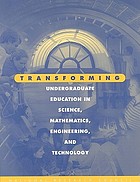
'Reading the book made me wish I could start teaching all over again. It is thought provoking with lots of suggestions for new and old teachers alike. I would recommend as a must to all NQT's, trainees and non specialists.'. Teresa Bird, Maths teacher, Burnley. It has challenged the way I approach, teach, and even think about maths myself. It is great to read a book written with such passion offering suggestions that anyone can try the next day. The ideas I have tried have been really successful and provided enjoyable and sometimes memorable experiences.
 Transforming Undergraduate Education in Science, Mathematics, Engineering, and Technology
Transforming Undergraduate Education in Science, Mathematics, Engineering, and Technology
Today's undergraduate students--future leaders, policymakers, teachers, and citizens, as well as scientists and engineers--will need to make important decisions based on their understanding of scientific and technological concepts. However, many undergraduates in the United States do not study science, mathematics, engineering, or technology (SME&T) for more than one year, if at all. Additionally, many of the SME&T courses that students take are focused on one discipline and often do not give students an understanding about how disciplines are interconnected or relevant to students' lives and society. To address these issues, the National Research Council convened a series of symposia and forums of representatives from SME&T educational and industrial communities. Those discussions contributed to this book, which provides six vision statements and recommendations for how to improve SME&T education for all undergraduates. The book addresses pre-college preparation for students in SME&T and the joint roles and responsibilities of faculty and administrators in arts and sciences and in schools of education to better educate teachers of K-12 mathematics, science, and technology. It suggests how colleges can improve and evaluate lower-division undergraduate courses for all students, strengthen institutional infrastructures to encourage quality teaching, and better prepare graduate students who will become future SME&T faculty.